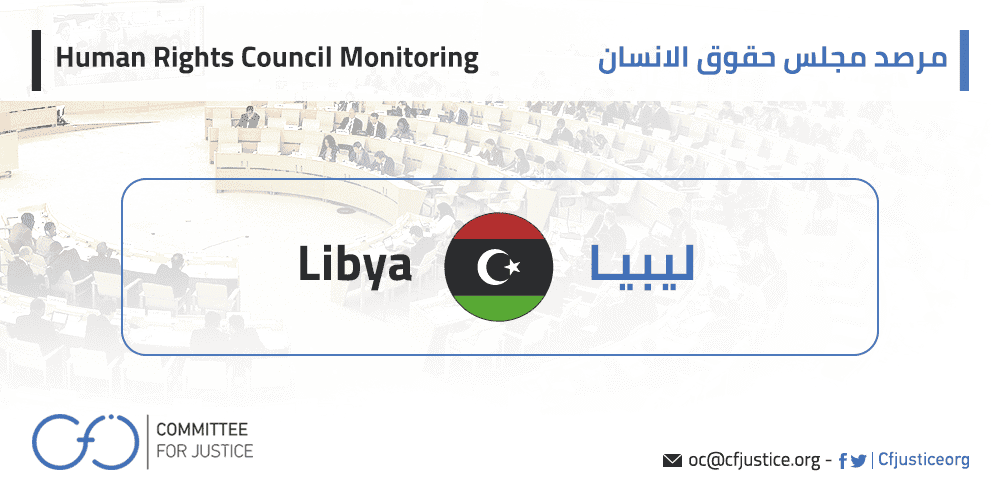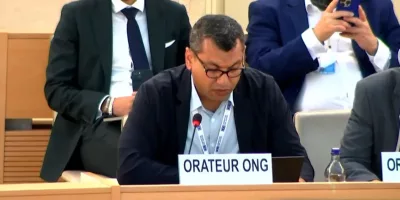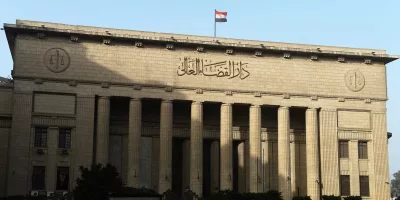News briefing
Translated and edited by: Committee for Justice
Geneva: 7 April 2022
UN experts have criticized the final version of the Libyan anti-cybercrime law, which was adopted by the House of Representatives on October 26, 2021, just one day after it was included in its agenda, without prior consultation with experts, civil society organizations or human rights defenders.
Concern about the timing and speed:
In a memorandum sent to the Libyan authorities on March 31, 2022, the experts expressed their concern that the Anti-Cybercrime Law could have a serious impact on the enjoyment of the right to freedom of opinion and expression and the right to privacy in the country.
The experts also expressed concerns about the timing of the law’s adoption, and its proximity to the presidential elections on December 24, 2021, which raises concern that such far-reaching provisions regarding the right to freedom of expression on the Internet have been implemented in order to be applicable to individuals who express their views online in relation to elections.
The experts called on the Libyan authorities to withdraw the law, and to conduct extensive multi-stakeholder consultations in the process of redrafting legislation on the issue of cybercrime, in order to ensure its scope and content are in line with Libya’s international human rights obligations.
The experts pointed out that the law, in its current form, does not meet the legality requirements under international human rights law to restrict freedom of expression, because the grounds for restrictions contained in the law have not been specified with sufficient precision, and it does not provide sufficient guidance on the circumstances under which content or websites may be banned, or when an individual’s actions or behavior online are deemed unlawful.
Controversial articles:
The memorandum drew attention to a number of articles of the law, and its observation on them, as Article 3 of the law states that the provisions of the law shall apply to any of the crimes contained therein if they were committed either in whole or in part in Libya, as well as if they were committed completely outside the region if it considered that “the repercussions of and the effects of these crimes could spread in Libya,” noting concerns that this extra-territorial element of the law provides broad jurisdiction, and allows Libyan authorities to target any individual, whether residing in the territory or anywhere else in the world.
Also, according to Article 4, the use of the Internet and “new technologies” is “legitimate and lawful”, as long as “public order and morals” are respected, and the experts considered that any use of the Internet in violation of these vague concepts could be considered illegal.
Also, according to Article 8, the Libyan Communications Regulatory Authority is given the ability to monitor and block access to all websites and pages that contain material it considers “contrary to public morals,” which means a restriction of the right to freedom of expression.
General notes on the law:
The experts considered that the law contains broad and vague terms, in clear violation of international legal standards regarding restrictions on freedom of expression, and specifically in that such restrictions must be drafted by law and with sufficient precision to allow individuals to act accordingly, which is why the cybercrime law is full of vague terms in a number of its articles that may have far-reaching consequences on the enjoyment of the right to freedom of opinion, expression and privacy.
The experts also stated that the provisions of this law may affect media freedom in Libya and the rights of journalists to seek, receive and impart information, including information related to the public interest.
The law also includes the threat of mass surveillance, digital security and the security of individuals. The law in its current form would give Libyan authorities far-reaching powers to conduct mass surveillance of individuals who use the Internet or digital technologies, which may constitute a violation of the right to privacy and the right to freedom of opinion and expression.
The law also allows blocking access to sites and content. The law gives the Communications Commission the right to monitor online activity. Article 7 of the law will also enable the authority to block sites and content if it is deemed to raise “racist or regional slurs and extremist religious or sectarian ideologies that undermine the security and stability of society.” This adds concerns regarding the authority granted to the authority to remove content and block access to websites without any judicial mechanism to monitor those decisions.
UN demands from the Libyan authorities:
The experts called on the Libyan authorities to clarify the measures that have been taken to ensure that the provisions of the Cybercrime Law are compatible with Libya’s obligations under international human rights law.
The experts also called on Libya to provide detailed information on the forms of information that the commission can monitor in accordance with Article (7) of the law, as well as what is meant by the phrase “any other techniques” in the same article, with an explanation of how Libya will assess the territorial scope of Article (3) and its application.






